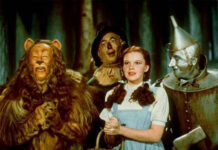In this seventh part of my retrospective Oscar Outlook, I’ll be eliminating six well-made dramas with differing levels of influence.
62. “Grand Hotel” (1931/32)
“Grand Hotel” is not dissimilar from many acclaimed pictures of its day in that it saves its best moment for the finale. More modern films sprinkle intrigue throughout, but “Grand Hotel” contains about an hour and a half of exposition before really starting to hit. I’m all for a character study that backs away from the narrative, but it’d be a bit strong to call this a character study. It’s more a showcase for some of the biggest actors of the day (Greta Garbo, John and Lionel Barrymore, Wallace Beery, and Joan Crawford) sharing some space together. The final moments boost this beyond where it would be otherwise.
61. “Unforgiven” (1992)
The Academy really loves Clint Eastwood. I think he’s fine. Hardly the most imaginative director, Eastwood just hits the important beats without ever taking a huge swing, at least in his Oscar-nominated efforts. “Unforgiven” fits neatly into that description, though it was probably cool to see a true Western with such high production values come out decades after the genre’s prime. The ending is hardcore, and is certainly the element that sticks with people. To the point, “Unforgiven” is perfectly serviceable as a Best Picture winner.
60. “Hamlet” (1948)
Shakespeare adaptations, based solely on their storytelling strength, rarely fail for me. This Laurence Olivier vehicle, in which he expertly portrays fiction’s most famous prince, is structurally sound and appropriately cinematic, which is not always a given in stories made for the stage. I like this Best Picture victory, especially considering that the Academy had to hop a little outside of the Hollywood bubble to reward a very British production. It was a small step that foretold even more inspired choices down the road.
59. “Mrs. Miniver” (1942)
“Mrs. Miniver” has aged quietly. It appears to have been made with little interest in lasting for longer than the span of World War II and really only works in that narrow framework. But for what it is, I do think there’s merit here. As a slice of life during that period, it does a very good job of tracking the differing feelings of the time and how each character might act depending on their sensibilities. The casualties are unexpected, though I think they come a bit too late. Had “Mrs. Miniver” been a tad bolder with its central themes in the first two acts, it could have sniffed the upper tier of Best Picture winners.
58. “Chariots of Fire” (1981)
Known now for its iconic theme song, “Chariots of Fire” is a decent movie. It’s a puzzling choice for the best of any year. Still, I’d recommend it to just about anyone, making it another Oscar winner that offends no one and lightly pleases all. I seem to recall watching this around the time of the most recent Olympics, and that’s certainly the ideal time to turn it on. Back on the subject of the score, it’s very interesting to have this and sci-fi classic “Blade Runner” (appropriate name) share a composer, Vangelis. This set the pathway to even more ambitious electronic music being used in grounded settings.
57. “Mutiny on the Bounty” (1935)
Thanks to a magnificent turn from Charles Laughton as the despicable Captain Bligh, “Mutiny on the Bounty” has some power. Basically every popular film dealing with non-white characters during this time in film history was missing the mark by a mile, and “Mutiny on the Bounty” fares as poorly as you’d expect in depicting the people of Tahiti. The less time all of these characters spend on land, the better. The Bounty is where all of the best bits occur, and by best, I mean the most brutal. Bligh’s sadism is disturbing, but difficult to turn from. Prepare to wait eagerly for the promised mutiny to commence.
Sam Zavada is counting down his ranking of every Best Picture winner in the history of the Academy Awards in the lead up to this year’s ceremony on March 2. Participate in the Times Leader Readers’ Ballot for the 97th Oscars by filling out the form at https://bit.ly/4hd8n6F. The Readers’ Ballot will close on Friday, Feb. 27, at 8 p.m. and will be revealed in the Saturday, March 1, edition of the Times Leader.
Sam Zavada is counting down his ranking of every Best Picture winner in the history of the Academy Awards in the lead up to this year’s ceremony on March 2.




